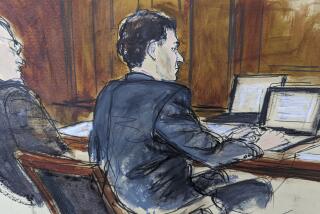Enron Altered Profit, Witness Says
- Share via
HOUSTON — A former Enron Corp. senior executive Wednesday said the energy-trading company was so obsessed during its heyday with meeting Wall Street’s expectations that executives altered official earnings reports and covered up bad news -- all with the knowledge of former Chairman Kenneth L. Lay and Chief Executive Jeffrey K. Skilling.
Mark E. Koenig, who ran Enron’s investor relations department and is the leadoff prosecution witness in the federal fraud trial of Lay and Skilling, testified that earnings were manipulated so that Enron could maintain its long streak of meeting or beating Wall Street securities analysts’ all-important “consensus estimate” of earnings per share.
Asked by prosecutor Kathryn H. Ruemmler if such adjustments were proper, Koenig, who has pleaded guilty to aiding and abetting securities fraud, responded: “It’s wrong.”
Koenig, 50, spent all day on the witness stand as prosecutors began building the case they had outlined in opening arguments Tuesday -- that Skilling and Lay lied repeatedly in a conspiracy to conceal Enron’s deteriorating financial condition and enrich themselves by keeping the stock price high.
Lawyers for Lay and Skilling on Tuesday attacked the government for “cherry-picking” excerpts of the defendants’ public statements to support its charges of lying, and they hammered on that theme Wednesday. The defense lawyers objected repeatedly to Ruemmler’s use of portions of audiotapes or transcripts, saying they were taken out of context.
U.S. District Judge Sim Lake crisply overruled the objections, once barking, “Have a seat,” when Lay’s chief lawyer, Michael W. Ramsey, rose to make a point.
Once-mighty Enron filed for Chapter 11 bankruptcy protection in December 2001 amid one of the nation’s most infamous corporate scandals.
Lay and Skilling’s defense is that the company was the victim of a “run on the bank” by creditors and trading partners spooked by the revelation of “a small pocket of fraud” led by former Chief Financial Officer Andrew S. Fastow. Lay and Skilling face decades of prison if convicted of the felony fraud and conspiracy charges they face.
Koenig told how in January 2000, on the night before Enron was to release its earnings for the fourth quarter of 1999, he got word that Wall Street’s consensus estimate had risen to 31 cents from 30 cents.
“I was kind of sick about it,” he testified.
The earnings news release had already been prepared, reflecting Enron’s actual earnings -- as calculated by its accounting department -- of 30 cents a share. If the company stuck to that number, Koenig realized, the stock would fall.
Koenig said he phoned Richard Causey, Enron’s chief accounting officer, and explained the problem. He said Causey replied that “he would talk with Mr. Skilling and get back to me.” Hours later, the report was adjusted to show earnings of 31 cents a share, which was the number that went into the company’s news release the next day, Koenig said.
Koenig said Lay later told him that he’d gone to bed with earnings at 30 cents and woke up the next morning to hear that they were 31 cents. Ruemmler asked Koenig if Lay seemed surprised or upset about the change.
“He understood the issue,” Koenig said. “He was matter-of-fact about it.”
Koenig also testified that Skilling actively participated in efforts to confuse investors about the poor health of Enron Broadband Services, a unit set up to trade bandwidth, or data-transmitting capacity.
Koenig will return to the stand today and may face cross-examination by defense lawyers as early as this afternoon.
More to Read
Inside the business of entertainment
The Wide Shot brings you news, analysis and insights on everything from streaming wars to production — and what it all means for the future.
You may occasionally receive promotional content from the Los Angeles Times.










